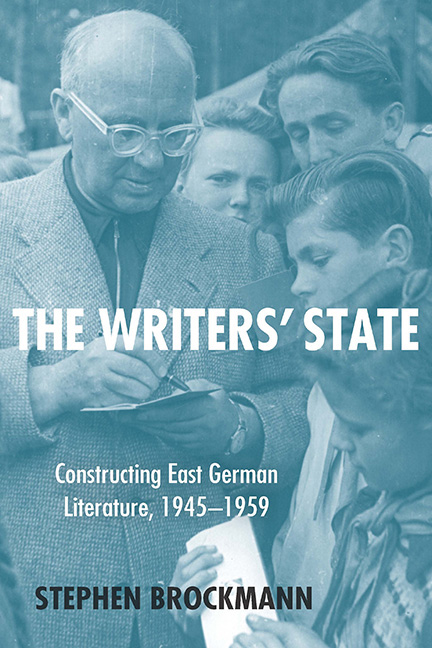Book contents
- Frontmatter
- Dedication
- Contents
- Acknowledgments
- Introduction: Reconstructing East German Literature
- Part I The Absence of State (1945)
- Part II Constructing the State (1949)
- 2 Brecht and the Battle of the Spirits, 1949
- 3 German Culture's Will to Power, 1949–50
- 4 Fascinating Fascists, 1949–50
- Part III Contesting the State (1953)
- Part IV The State Cracks Down (1956)
- Conclusion
- Selected Bibliography
- Index
2 - Brecht and the Battle of the Spirits, 1949
from Part II - Constructing the State (1949)
Published online by Cambridge University Press: 05 February 2016
- Frontmatter
- Dedication
- Contents
- Acknowledgments
- Introduction: Reconstructing East German Literature
- Part I The Absence of State (1945)
- Part II Constructing the State (1949)
- 2 Brecht and the Battle of the Spirits, 1949
- 3 German Culture's Will to Power, 1949–50
- 4 Fascinating Fascists, 1949–50
- Part III Contesting the State (1953)
- Part IV The State Cracks Down (1956)
- Conclusion
- Selected Bibliography
- Index
Summary
NOT ALL SOUTH GERMANS IN BERLIN during the postwar years were as enthusiastic in their patriotism as Johannes R. Becher. The Augsburger Bertolt Brecht, who arrived in the ruined German capital more than three years after Becher, in late October 1948, recorded feelings that were considerably more ambivalent, but also more acute about the sometimes bizarre humor to be found in the desperate situation of postwar Germans. Brecht called Berlin “an etching by Churchill based on an idea by Hitler” or, alternatively, “the heap of rubble near Potsdam.” On his first morning in the city, the returning émigré made a point of visiting the ruins of Hitler's chancellery in order to savor the extent of the Nazi dictator's defeat: “Early at 6:30 a.m. I walk down the ruined Wilhelmstrasse to the Reich Chancellery. In order, so to speak, to smoke my cigar there. A few workers and rubble women. The ruins make less of an impression on me than the thought of what people must have experienced during the destruction of the city.”
Brecht was sensitive to the stories he heard about the Battle of Berlin, which had taken place in April and May of 1945. In his diaries he expressed both sympathy for and impatience with the city's ordinary inhabitants. On the one hand, he wrote: “Even now, after three years … panic still resonates among the workers, caused by the plundering and rapes that followed the conquering of Berlin.” After the Red Army had taken Berlin, Brecht wrote, drunken hordes of Soviet soldiers “swarmed through … the buildings, grabbed the women, shot men and women who resisted, committed rape in front of the eyes of children, stood in lines in front of buildings, and so on.” Brecht's colleague Heinz Kuckhahn—who had worked with the playwright during the Weimar Republic and was about to collaborate with him again on the Berlin premiere of the antiwar masterpiece Mutter Courage und ihre Kinder (Mother Courage and Her Children)—told the writer that he had seen “a seventy-year-old woman, shot dead after being raped.” The Soviet cultural officer Alexander Dimshitz, who officially welcomed Brecht to Berlin on 23 October, attempted to explain the ferocity of Soviet soldiers during and after the Battle of Berlin by pointing out to Brecht how difficult it had been, in 1941–42, […]
- Type
- Chapter
- Information
- The Writers' StateConstructing East German Literature, 1945-1959, pp. 73 - 105Publisher: Boydell & BrewerPrint publication year: 2015



